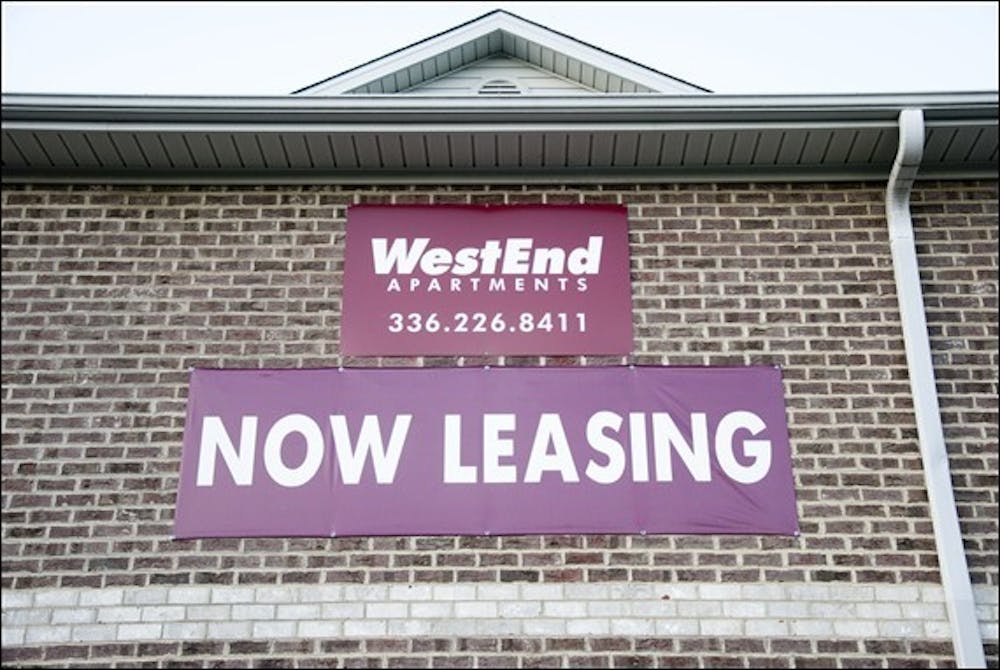David Hancock spent $700,000 remodeling one of his two apartment complexes in the town of Elon. Hancock, owner of Time Properties in Burlington, added more amenities to try and attract students — a pool, hot tub, volleyball court, weight room and tanning bed. He bought new appliances, updated the bathrooms and painted some of the walls a shade of light blue. He even changed the complex's name to appeal to other people in the community. But Cypress Pointe apartments are still one-third empty, and it isn't the only complex in Elon with vacant units.
A surplus of housing options came with the construction of new off-campus apartment complexes and townhouses in Elon throughout the past decade. New and spacious, these units have garnered the business of Elon University students for several years, though not all are completely occupied.
But the university, which already had plans to build The Oaks and Colonnades to provide on-campus, apartment style housing for students, carried out its construction plans, too.
And the plans aren't finished.
"Students like living in university housing," said Smith Jackson, vice president and dean of Student Life. "Our maintenance program is superior. Our facilities are better constructed. Our security is going to be there in a flash, and students appreciate that."
In addition to the three dormitories that were added to Colonnades this fall, the university is in the process of constructing The Station at Mill Point, a village of townhouses exclusively for juniors and seniors.
Jackson said the university's construction is a response to student demand for on-campus housing that hasn't been met in years.
"When we put in the requirement that sophomores must live on campus, the number of juniors and seniors wanting to live on campus doubled," he said. "Since 2000, we haven't met the demand."
Hancock said he believes the ongoing construction of Elon residential areas is going to lead to the university requiring more students to live on campus.
"I'm sure it's not talked about," Hancock said. "But I guarantee, eventually, Elon's plan is to have all juniors live on campus. Every business entity in the world has to increase revenue to survive. A big untapped source of revenue is the housing of juniors and seniors."
Currently, the university requires all freshmen and sophomores to live on campus, though sophomores can apply for permission to live off campus. Jackson said that though the university has made no plans to require all students to live on campus, Elon would like to see the number of upperclassmen living on campus grow.
"We don't have a goal for 100 percent of students to live on campus," Jackson said. "But we do want to see more juniors and seniors living on campus. I think we'll get to that point and then decide if it's enough."
The addition of new on- and off-campus housing has forced older apartments to remodel and improve their facilities, Jackson said.
In addition to the remodeling of Time Properties' Cypress Pointe, formerly known as Phoenix West, other property owners are looking to update older complexes to continue to attract student renters.
Christy Donaldson, an employee of BC Parker Real Estate, said the company has begun to remodel units in Trollinger to make them more appealing to students.
After applying to move off campus as a sophomore, Kaitlyn Palumbo said although she knows Elon's townhouse options for upperclassmen will be attractive to some students, she couldn't foresee herself returning to university-owned housing.
"I don't think that I would move back on campus to live in the new townhouses because my rent is low and I'm living with great friends in a nice house already," Palumbo said. "The rent ended up being even cheaper than living in a dorm."
Senior Mary Kate Hinshaw, who has lived on campus all four years at Elon, said she believes in the reasons behind Elon's push for juniors and seniors to live on campus, but questions how long it might take to convince more upperclassmen to stay on Elon's grounds.
"I think that it's great that Elon is trying to increase the number of upperclassmen who live on campus by building The Station at Mill Point," Hinshaw said. "I don't know if they'll be entirely successful right away. It might take some time to transition, but I think that they'll definitely be able to fill up The Station eventually."
Jackson said the university is conscious of apartment vacancies and complexes that are too vacant would eventually have to recruit renters from the community. But the university wouldn't consider that enough reason to halt its plans for growth, he said.
"We can't stop free enterprise," Jackson said. "The town doesn't want to stop people from being able to try to rent things out if they want to. It's market-driven."
Nevertheless, Elon has made no pledge to stop expanding its on-campus housing options, and risk still stands for the property owners who have chosen to invest in the town and the students.
"The benefit to provide more housing on the campus far outweighs the potential that off-campus housing may not be filled," Jackson said. "I don't think it'll be so much that it'll dramatically alter occupancy in those spaces, but if I owned one of those places, I would be concerned, too"


